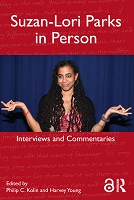Chapter Introduction
Proposal review
“WATCH ME WORK”: REFLECTIONS ON SUZAN-LORI PARKS AND HER CANON
Abstract
Suzan-Lori Parks is widely recognized as one of the most provocative and prolific dramatists of the current millennium. The winner of numerous awards, including the Pulitzer Prize for Drama and the Tony Award, Parks has given the American theater an entirely new, challenging stage language that resonates with insightful puns and historical allusions. Only three years after her college graduation and the production (as a staged reading) of her first play, her senior thesis, The Sinner’s Place (1985), Suzan-Lori Parks’s immense talent and potential to radically transform American theater were widely touted by leading theater critics. In 1989, Mel Gussow, senior critic for the New York Times, lauded the playwright for her “theatrical versatility” and originality. Four years later, the New York Times hailed her as one of “30 artists under 30 most likely to change the culture for the next 30 years,” and in 1999, Time Magazine numbered Parks among the “100 Innovators for the Next Wave.” Two years later, Parks, who by then had already won two OBIE Awards, was given a $500,000 “Genius” grant from the MacArthur Foundation. The following year, she won the Tony Award and the Pulitzer Prize for Drama. Since then, she has re-envisioned the idea of the “world premiere” and “opening night” by having her collection of more than 365 plays, 365 Days/365 Plays, staged at over 700 theaters in the United States and approximately 100 theaters across Canada and Europe from 2006–2007, thrown back the curtain on her writing process by literally inviting audiences to “Watch Me Work,” and adapted American operatic and literary classics, such as Porgy and Bess and Their Eyes Were Watching God, for the theatrical stage and the television screen. Although primarily a playwright, Parks has demonstrated exceptional talent in art forms other than theater. She is a best-selling novelist (Getting Mother’s Body) and a screenwriter (Spike Lee’s Girl 6). A musician, she wrote the score for Father Comes Home from the War and the libretto for Ray Charles Live!—A New Musical! Parks even composed several original songs, including “The Looking Song” for her Red Letter Plays, In the Blood (1999) and Fucking A (2000). As a vocalist and guitarist as well, she has reincarnated herself as Sula Parks and has performed at the Public Theater and elsewhere.


 Download
Download